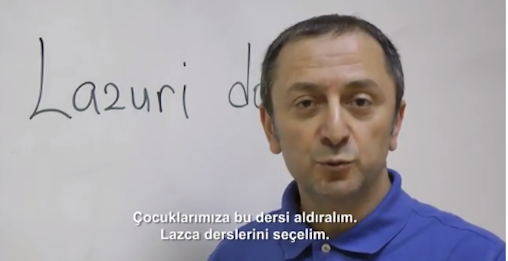Turkey’s Laz Language Institute released a series of videos to promote the selective Laz language courses for elementary school level with a slogan "Lazuri Dovigurat (Let’s learn Laz)“.
bianet interviewed İsmail Bucaklişi, a part time lecturer at Boğaziçi University and member of the institute.
First year of Laz as elective course
A commission has been formed last year with the efforts of Laz Language Institute to create a curriculum - which has been admitted by education ministry authorities on August 28, 2013.
Bucaklişi told bianet that more than hundred students took the class as elective in 4 school in Rize’s Fındıklı district and Artvin’s Arhavi district. However, only 84 were enrolled due to student quotas.
“What use will it have?”
Bucaklişi said one of the main reasons for low rates was lack of information. He also listed the other factors: “It is regarded as unnecessary. ‘What use will it have?’ some ask. Other families worry whether their children would have face issues [with the administration].
New generations and Laz
So, how do new generations regard at Laz language?
“98 percent of children whose parents are fluent at Laz are unable to speak at all. Though those in the rural areas understand the language even if they claim that they don’t know it.”
Situation of Laz language
“I think there are over 1 million Laz language speaker potential in Turkey. Among these, around 250,000 to 500,000 have a relation with the language. Active Laz language speakers are around 100,000. Fluent speakers around 20,000 to 30,000.
“The interlocutors are aged over 40. The numbers drop as the age so. Elders have a language pool related to rural life. Most Laz people now have an urban life and these words have issues describing this urban life.”
What should be done?
“We should create awareness on the issue. We must over the ‘What use will it have?’ mentality. Language is not a meta, it is a value. It should be regarded that way.
“Otherwise it causes the image that language is a valueless thing that does not generate any income, and people tend to undermine their own mother tongues. This comes from inside, but also there are outside factors such as Turkey’s assimilation policies that started from the 1980s. ”
Bucaklişi claimed that not only the Turkish state but also Laz intellectuals didn’t contribute to the resolution of the issue. He complained that there was a general disinterest on the issue.
Bucaklişi said even though there is a sympathy towards Laz language speakers in Turkey, it is not enough.
“It is all up to those who are sensitive about the issue,” he said. (BK/BM)
* Click here to read the article in Turkish.






.jpg)
.jpg)


